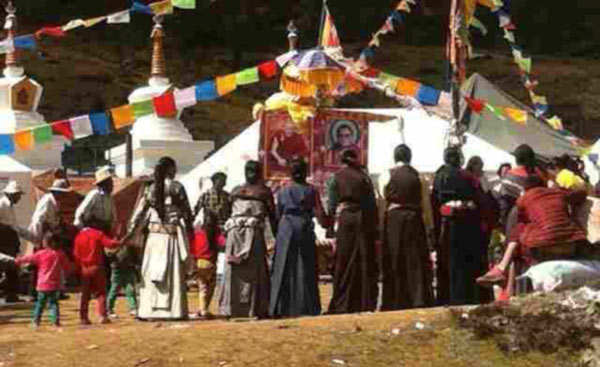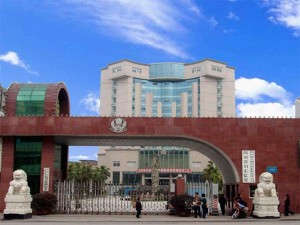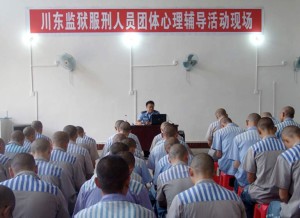
Local Tibetans gather to pray for Tenzin Deleg Rinpoche in his home area in Kham on October 12, 2014.
- An influential and much-loved Tibetan lama, Tenzin Delek Rinpoche, died on July 12 in his 13th year of a life sentence in prison. Armed security forces have been deployed as hundreds of Tibetans gathered today to call for his body to be returned to his monastery and community in the home area of Tenzin Delek Rinpoche, who was one of the most high-profile Tibetan political prisoners.
- Tenzin Delek Rinpoche died in prison without his family being allowed access except for six visits in 13 years, most recently in 2013, despite requests for his release on medical parole being made by a number of Western governments.[1] His relatives said that in 2013, they became aware that he was suffering from a heart condition, frequent unconsciousness and uncontrollable shaking of parts of his body. It is not known whether Tenzin Delek Rinpoche, who was 64, had received any medical treatment in prison.
- In distress at the news of his death, hundreds of Tibetans, both monks and laypeople, have been gathering today in his home area of Nyagchuka (the Tibetan area of Kham), calling for answers from the authorities about the circumstances of his death and the release of his body for traditional prayers. In response the Chinese authorities have deployed armed troops, set up police checkpoints, blocked major roads, and cut communications in the area, according to Tibetan sources in exile.
A relative of Tenzin Delek Rinpoche who lives in exile in India, Geshe Nyima, said today: “This is an unimaginable loss not only for our family and friends but for the Tibetan people – so many of whom appreciated his work in education and protecting our religion and environment. Tenzin Delek Rinpoche was an innocent monk who suffered over 13 years of unjust imprisonment, torture and abuse in a Chinese prison for simply advocating for the rights and wellbeing of his people and for expressing his devotion to His Holiness the Dalai Lama. His sentencing to life badly hurt the Tibetan people. Now our sole request is for the Chinese authorities to return his body to his monastery and community.”
The outpouring of grief about Tenzin Delek Rinpoche, which follows prayer ceremonies, vigils and protests over years of his imprisonment, demonstrates the influence and popularity of Tenzin Deleg Rinpoche – among both the Tibetan community and many Chinese Buddhists – and what he represented to the Tibetan people. Before his detention in 2002, Tenzin Deleg Rinpoche founded schools for nomad children, set up elderly people’s homes, worked with local officials to protect forests and was well-known for his efforts to preserve Tibetan culture.
The anguish of Tenzin Delek Rinpoche’s family and monastic community has been compounded by the secrecy of his prison conditions and inability to gain any access to him. In his 13 years of imprisonment, members of Tenzin Delek Rinpoche’s family were allowed to visit him only six times, with the last visit in November 2013. They found out that he had had some sort of heart problem, possibly a heart attack, that part of his body was shaking uncontrollably, and that he had lost consciousness on numerous occasions.

The main gate of Chuangdong Prison in Dazhu county, Sichuan, where Tenzin Delek Rinpoche was imprisoned.
Geshe Nyima, the relative in exile, said: “There are so many unanswered questions about how he died; was it due to poor health, lack of medical treatment, or was he subjected to torture or other poor treatment that resulted in his death?”
According to the same sources, “more than a thousand” Tibetans gathered today to call for the return of his body in his home area of Nyagchuka (Chinese: Yajiang) county in Kardze (Chinese: Ganzi) Tibetan Autonomous Prefecture in Sichuan (the Tibetan area of Kham). Last October, Tibetans gathered in Nyagchuka, to pray for Tenzin Delek Rinpoche in the then 12th year of his imprisonment. News of the prayer ceremony followed other initiatives by local people, including the rebuilding of his residence in a monastery, and a major religious ceremony for his long life in June 2014, which was blocked by the authorities.[2]
The prayer ceremony in Nyagchuka on October 12, 2014, was the latest in a series of bold representations to the authorities in support of the Tibetan lama over several years. Not only Tibetans have been involved; over the years of Tenzin Delek Rinpoche’s imprisonment, many Chinese Buddhists have joined vigils and long life prayers for him.[3]
Matteo Mecacci, President of the International Campaign for Tibet, said: “This shocking news of the death in prison of a much-loved Tibetan lama should also serve as a strong message to governments and international institutions of China’s intransigence. Tenzin Delek Rinpoche was one of the most prominent Tibetan political prisoners and serious concern about his welfare was raised by many Western governments, including the U.S. and the E.U., and led to requests of medical parole. Despite these efforts, Beijing failed to release Tenzin Delek Rinpoche. We now call upon governments and to the United Nations to request China to properly investigate, according to their prison law, the causes of this abnormal death and also to seek the immediate return of Tenzin Delek’s body to his family and monastic community.”

This image shows a patriotic education session at Chuandong prison in 2012.
In a precursor to Tenzin Delek Rinpoche’s death, Lobsang Dhondup, who was arrested at the same time as Tenzin Delek Rinpoche in 2002, was executed in early 2003. This occurred even though the Chinese authorities had assured a U.S. government delegation headed by Lorne Craner, Assistant Secretary of State for Democracy, Human Rights and Labor, and including Assistant Attorney-General Ralph Boyd that the Supreme People’s Court would undertake a ‘lengthy’ judicial review of Lobsang Dondrub’s death sentence. Instead he was executed a few hours after his death sentence was approved by a session of the Sichuan Province Higher People’s Court.[4]
Both Tenzin Delek Rinpoche and Lobsang Dhondup were detained, tried and convicted when Zhou Yongkang was Party Secretary of Sichuan Province. The former head of China’s security services is now in prison after being convicted of a series of corruption charges including bribery, abuse of power and leaking state secrets.
Tenzin Deleg Rinpoche maintained that he did not confess to any of the charges of bombing against him. During his sentencing, which was attended by two of his family members, he declared the trial unfair, rejected all charges against him, and proclaimed his innocence before being removed from the court. In a tape smuggled out of prison in January 2003, whilst he was awaiting the outcome of an appeal, he said, “Whatever [the authorities] do and say, I am completely innocent. I was wrongly accused because I have always been sincere and devoted to the interests and well-being of Tibetans. The Chinese did not like what I did and what I said. That is the only reason why I was arrested. I have always said we should not raise our hands at others. It is sinful. I have neither distributed letters or pamphlets nor planned bombs secretly. I have never even thought of such things and I have no intention to hurt others.”
Well-known Tibetan writer Tsering Woeser had written before his death: “The hardship he [Tenzin Deleg Rinpoche] is currently enduring in prison engulfs the hearts of the people of this vast area; they feel a deep, hard-to-overcome pain. Over the course of the past 12 years, almost no joyous festivals have been held, and many elders left this world with tears in their eyes, knowing that they would never meet him again.”[5]
Recommendations
As a matter of urgency, ICT calls upon the international community to:
- Urge the Chinese authorities to return the body of Tenzin Delek Rinpoche to his family and monastic community, and to act with restraint towards Tibetans seeking to express their grief;
- Make public statements expressing their concern about the death of Tenzin Delek Rinpoche;
- Raise urgent questions with the Beijing leadership about the circumstances that led to Tenzin Delek Rinpoche’s death and whether medical treatment was provided to him;
- Article 55 of the PRC’s Prison Law states, “If a prisoner dies an abnormal death, the people’s procuratorate shall immediately conduct examinations and make an appraisal on the cause of the death.” The Chinese government should implement its Prison Law by conducting a medical appraisal and providing his family members with the report;
Correction: We erroneously reported that Tenzin Delek Rinpoche had received one visit from his family during his 13 years in prison. This was incorrect and we have changed this above.
Footnotes
[1] In a letter to the U.S. Special Coordinator for Tibetan Issues, Sarah Sewall, dated April 1, 2015, Congressional Representative Jim McGovern, said, “I respectfully request that you and others at the State Department and the U.S. Embassy in China make his release on Medical Parole a priority so that he might have the opportunity for medical treatment outside Tibet and China as soon as possible.” I’Ct report: https://www.https://savetibet.org/call-for-medical-parole-for-tibetan-buddhist-teacher-tenzin-delek-rinpoche-on-the-13th-anniversary-of-his-imprisonment/
[2] ICT report, October 17, 2014: https://savetibet.org/tibetans-gather-to-pray-for-imprisoned-tibetan-religious-teacher/
[3] For details of demonstrations in his support over the years, also see ICT report, December 17, 2009, https://www.https://savetibet.org/tibetans-defy-security-crackdown-to-demonstrate-in-support-of-imprisoned-tibetan-lama/
[4] Tenzin Deleg Rinpoche was first detained from his monastery in April, 2002. For details on his case see CECC Issue Paper, ‘The Execution of Lobsang Dondrub and the Case Against Tenzin Deleg: The Law, the Courts, and the Debate on Legality’, http://www.cecc.gov/publications/issue-papers/the-execution-of-lobsang-dondrub-and-the-case-against-tenzin-deleg-the-law#6 – See more at: https://savetibet.org/tibetans-gather-to-pray-for-imprisoned-tibetan-religious-teacher/
[5] Blog by Tsering Woeser, posted on October 17, 2014, “Remembering Tenzin Delek Rinpoche Who Has Been Wrongfully Serving A Prison Sentence for 12 Years”, http://highpeakspureearth.com/2014/remembering-tenzin-delek-rinpoche-who-has-been-wrongfully-serving-a-prison-sentence-for-12-years-by-woeser/ – See more at: https://savetibet.org/tibetans-gather-to-pray-for-imprisoned-tibetan-religious-teacher/

